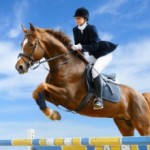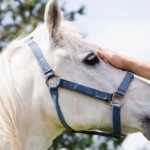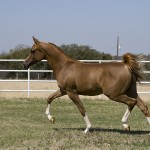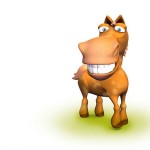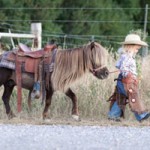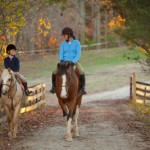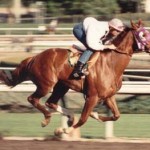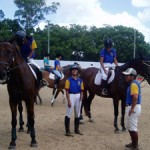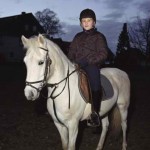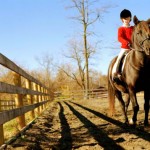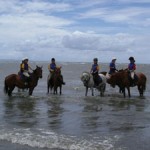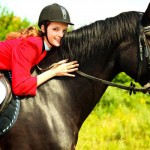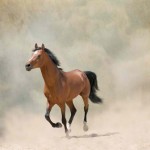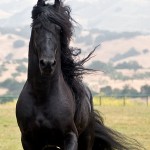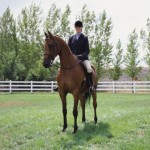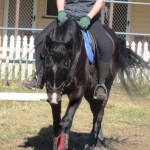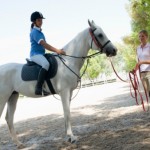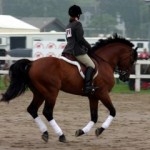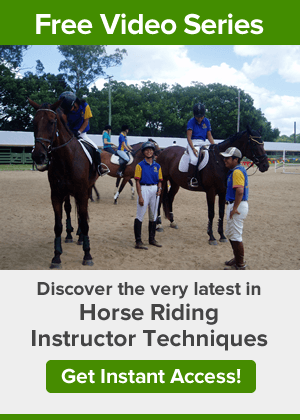In a highly competitive environment, it is easy to become very critical of others “How could THAT horse win, didn’t the judges see that all the changes to the left were late behind” “She couldn’t sit to the trot to save herself” “Who owns that umbrella? It is scaring my horse!” Instead, we would remain in a far happier state of mind if we were more appreciative of other horse/ rider combinations “I liked the way he rode when he corrected that resistance/ evasion” “Every time I have seen that combination they have continued to improve” “Wow it is raining, what a great opportunity to expose my horse to wet conditions” If you tend to get tense and nervous at competitions, try using these strategies Remember that people have different reasons for riding at the … [Read more...]
Strategies for Settling Competition Nerves
Understanding Horses
Have you ever had your foot stood on by a horse? Horses’ brains have been wired to remember the negative/ survival memories. These survival memories have evolved the need to remember danger, potential danger and to act as a herd when another horse is acting suspiciously. They don’t always have the same thought patterns as humans, so if we plan to ride them, train them, teach them and teach with them it is in our best interests to understand them as much as possible. The next time a horse shies, bucks, kicks out or even if one stands on your foot, then try to understand from their point of view what made them do it. Real horse people don’t blame horses; they only continue to deepen their understanding about them. … [Read more...]
Teaching Trot Diagonals
When your student doesn’t understand something (such as trot diagonals), most coaches automatically go back and re-explain in more simplified terms.Part of re-explaining in simplified terms is to break down a complicated skill into steps. As students develop a greater understanding of riding at each level, they are more likely to progress on to the next level without the constant need for revision and to go back and ‘fill in the gaps’. The explanation ‘Just sit each time the shoulder moves back/forward/up/down does not give a student sufficient understanding of trot diagonals. Unless an instructor has a system of how to teach trot diagonals, it can be confusing for their students and anyone watching the lesson. While I may not teach every step every time, these are the steps I … [Read more...]
Teaching Children To Ride Horses
Tips For Teaching Children’s Horse Riding Lessons If you were one of the people who took our recent survey, THANK YOU! In particular, if you were one of the people who asked for some tips for teaching children then this series of tips for teaching children’s horse riding lessons has been written for you! 1. Keep Children Active And Moving In Their Riding Lessons Children like active riding lessons with maximum participation. Once they have learnt their A, B & C’s (attitude, balance and control) they generally love to canter and jump. They like to keep moving, but rather than having the ride go in single file behind one leader for the whole lesson try these suggestions - change leaders - go into and out of open order - leading files in succession … [Read more...]
The Two Sides of Motivation
We often associate motivation with physical energy. A motivated rider is one who is up early and always rides, usually a number of horses. A motivated instructor creates engaging lessons and continues to learn and improve their teaching skills To balance this physical energy there must be thought and a period of quiet reflection and planning A motivated rider/ instructor trainer will use this time to reflect on what worked well and how to incorporate this in their plans for the future Remember to plan well and stay motivated! Happy Riding, Glenys :-) … [Read more...]
Final Step to Achieve Your Horse Related Goals
This final video in this series brings together the final step to achieve your horse riding, equestrian teaching and equine career study goals. In the video we discuss the 'Get Ready, Get Set and Go' of this step to make your horse related goals into a reality! Remember to view the three videos in this series Video One - What Are Your Horse Riding, Teaching and Study Goals? Video Two - Plan Your Horse Riding, Teaching and Study Goals! Video Three - Achieve Your Horse Riding, Teaching and Study Goals! Happy Riding, Glenys :-) (Ms) Glenys Cox Director - Online Horse College P.S. Just in case you missed the previous videos :-) … [Read more...]
Teaching Canter Video
If you were one of the people who used the techniques I suggested for teaching trot, thanks for your positive feedback! When you teach some-one how to perform a skill it makes you analyze the whole process in a lot more depth. So when I am training some-one how to teach a skill I analyze both the skill development and the teaching process in a lot more depth. People have been asking me about teaching canter to beginners, so I have made this video with some tips on both the skill development of the learner and the teaching process for the horse riding instructor. Click Here For A Video With Tips On Teaching Canter Students enrolled in our new updated courses will have access to these videos and many more as part of their Student Resources. If you enroll now, you can save … [Read more...]
Teaching Confidence
I have some potentially bad news for you below. But first... Thanks again for those who have sent me the positive feedback on the tips for teaching trot and canter to complete beginners. Now for those horse riding instructors who would like to have some tips on teaching confidence. How often do you talk to someone who has lost their confidence on a horse? Sure you have. We ALL have! Why? There are many reasons why people lose their confidence! They may have only been on a horse once, or they could have ridden when they were younger or have a bad memory with a horse. Click Here For The Free Video On Teaching Horse Riding Confidence Watch this short video I've prepared for you because I reveal some tips for teaching your riders to be confident in any situations! Now, for the bad news... It … [Read more...]
How Is Your Horse’s Satisfaction Rating Of You?
This is a checklist for your horse’s satisfaction rating Methods to measure students’ satisfaction during their riding lessons are fairly well researched, but the horses’ satisfaction in their lessons is also important. Children may jump out of the car and quickly find their favorite horse to say ‘hello’, does your horse have their ears pricked and look forward to visits from humans? When a student is getting ready for their riding lesson they could be excited about their lessons. While you may not want your horse to be excited, are they entering the arena pleasantly without napping, snarling their face or swishing their tail? Even when a student is concentrating on improving their riding, they should be enjoying themselves. Does your horse understand what you ask and do … [Read more...]
How to Properly Canter on a Horse
When you are learning how to canter on a horse, there are many problems that the movement of cantering can cause. These tips will minimise those problems so you can enjoy cantering a horse. How To Canter Cantering a horse is much the same as sitting trot, the seat (pelvis, thighs and hip joints) will be required to follow the canter movement. The seat should flow and remain in contact with the saddle forming a series of arcs (which may form an outline simular to that of the lower side of an egg which is laid on its side). It can be described that there are 3 sensations to be felt at canter: First, a lowering or sinking of the seat. This coincides with the first hind-leg in the canter sequence coming down to touch the ground. Then, sliding or floating forward in the saddle. The … [Read more...]

